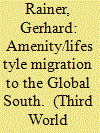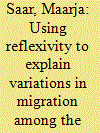|
|
|
Sort Order |
|
|
|
Items / Page
|
|
|
|
|
|
|
| Srl | Item |
| 1 |
ID:
167072


|
|
|
|
|
| Summary/Abstract |
While most research into amenity/lifestyle migration still focuses on rural places in the Global North, it has recently been acknowledged that international North–South migration is a growing phenomenon. Against the backdrop of strong media attention to Global North immigration, there is a need to focus more on the rapidly increasing – but much less visible – migration streams of lifestyle/amenity movers to the Global South, and particularly on their implications for local and global inequalities. This is what this paper proposes, and it pursues this goal by providing a comprehensive review of the growing interdisciplinary literature on amenity/lifestyle migration in Latin America. From a critical geographical perspective, it firstly discusses key political economic factors that drive the production of high-amenity places in Latin America. The focus will be on real estate business and land markets. Secondly, the article analyses the local to global socio-spatial consequences of international amenity/lifestyle migration. The paper argues that amenity/lifestyle migration to Latin America builds on, and deepens, historically inherited global and local inequalities, which in many areas – rural and, increasingly, also urban – manifest themselves through growing social-spatial exclusion and fragmentation.
|
|
|
|
|
|
|
|
|
|
|
|
|
|
|
|
| 2 |
ID:
160643


|
|
|
|
|
| Summary/Abstract |
This article investigates how US citizens living in Granada, Nicaragua, negotiate transnational belonging. Best known for a revolution and covert US intervention, Nicaragua, and in particular, the colonial town of Granada, has become a popular site for settlers from the Global North. Similar to other cases of ‘lifestyle migration’, these migrants enjoy spacious homes, maids, and upscale restaurants in a country ranked second poorest in Latin America, and governed by none other than El Comandante Ortega himself. They do not sever ties with their homeland, and form strong attachments in their new land. Fieldwork conducted in 2016 reveals that despite their international mobility, cosmopolitanism does not characterize how these migrants belong in the world. Instead, they practice privileged transnationalism in which their economic, political, and cultural power relative to that of their hosts facilitates both their mobility and their comfortable sense of rootedness in their sites of origin and settlement.
|
|
|
|
|
|
|
|
|
|
|
|
|
|
|
|
| 3 |
ID:
119220


|
|
|
|
|
| Publication |
2013.
|
| Summary/Abstract |
While much research on migration and China focuses on the overseas Chinese, this research will instead analyse the migration of Taiwanese to China. This article uses data gathered in Dongguan and Shanghai in 2004-5 with follow-up interviews in 2008-10 to study the migration experiences of Taiwanese in China and to illustrate how class affects the migration of the privileged. Despite the diverse backgrounds of the female respondents considered in this article, most of them had a higher socio-economic status than the Chinese people they encountered. Because of the difference in social class, the respondents were reluctant to mix with locals. The ensuing sense of alienation has partly caused the respondents to identify themselves as less Chinese than before moving to China.
|
|
|
|
|
|
|
|
|
|
|
|
|
|
|
|
| 4 |
ID:
169046


|
|
|
|
|
| Summary/Abstract |
Migration literature has traditionally distinguished between different motivations of migration, such as labour, family and newly also lifestyle migration, never fully exploring the background of these motivations. This article suggests that these different motivations may be explained by different modes of reflexivity as distinguished by Margaret Archer. Linking modes of reflexivity with migration motivations addresses two problems in current migration literature. First, it provides for practical application of reflexivity in explaining migration motivations, which has been missing so far. Second, the article advocates using psycho-social approach as opposed to more commonly adapted ethnical or class based explanations in understanding migration behavior, hence avoiding the potential trap of falling into the trap of methodological nationalism or classism. Through the interview with highly-skilled Estonian migrants it is shown that the reasons of migration among highly skilled are versatile and cannot be explained solely by their class background.
|
|
|
|
|
|
|
|
|
|
|
|
|
|
|
|
|
|
|
|
|